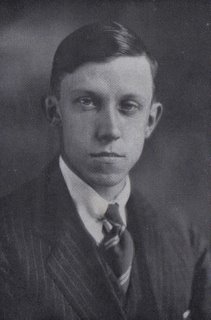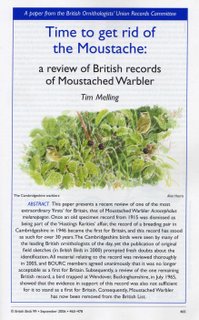 I guess life went at a gentler pace in the old days... Harry Witherby, from 1907 the founder and founding editor of British Birds magazine, limped on until 1943 when, brought out of semi-retirement by the war, the effort did for him. He died. 36 years is, frankly, too long for any Editor, and it's fair to say that BB was sleep-walking. Cometh the hour, etc. a terse note in the next issue of BB that his no. 2, Bernard Tucker, was taking over the editorship for the time being 'in accordance with what I believe to be Mr Witherby's wishes'. !!! Sounds a bit USSR to me. Like Khrushchev succeeded Stalin 'in accordance with Comrade Stalin's wishes' mostly by no one noticing he was doing it.
I guess life went at a gentler pace in the old days... Harry Witherby, from 1907 the founder and founding editor of British Birds magazine, limped on until 1943 when, brought out of semi-retirement by the war, the effort did for him. He died. 36 years is, frankly, too long for any Editor, and it's fair to say that BB was sleep-walking. Cometh the hour, etc. a terse note in the next issue of BB that his no. 2, Bernard Tucker, was taking over the editorship for the time being 'in accordance with what I believe to be Mr Witherby's wishes'. !!! Sounds a bit USSR to me. Like Khrushchev succeeded Stalin 'in accordance with Comrade Stalin's wishes' mostly by no one noticing he was doing it.Bernard Tucker, overgrown public schoolboy, Harrow and Oxford, crumpets and thrashings, was a bit of a firebrand in the birding field, and already a giant before accepting the majesty and authority that came with being Editor of BB - at the time, the SOLE arbiter of acceptance/rejection of all British rarities! Birding since schooldays... kept snakes in his rooms while studying for his zoology degree, worked at Cambridge University for a while (I assume this is where he flirted with communism and learnt to appreciate the benefits of a good purge), returned to Oxford as a Lecturer, and stayed. He was a thinker. And a doer, actually. The 'doing' generally being extraordinarily close observation of birds, alive, in the wild. Taxonomy was one of his fields, and he wrote about subpecies, species boundaries, etc. in a lengthy article in BB that you could probably reprint without revision today and it would STILL be useful. His most widely respected body of work was perhaps the sections on 'Field-characters and General Habits' 'Voice' and 'Habitat' (among other bits and bobs) for The Handbook of British Birds - difficult to appreciate these days quite how revolutionary this was in being broadly accurate(!), and how few people at the time could have written so comprehensively. He was instrumental in founding the British Trust for Ornithology and the Edward Grey Institute; he wrote papers (often for stupidly dull and now forgotten journals); he edited reports, founded bird clubs, and ran them; he was an extraordinary pedant and a stickler for scientific method; he travelled; and at the end he rescued and rejuvenated British Birds.
 Real birdwatchers... will have seen recently in British Birds the 'Adios Moustached!' paper, describing the reasons for the deletion of Moustached Warbler from the British List. The Cambridgeshire 1946 record of a pair of birds feeding young came over his desk (as sole arbiter etc.) and he accepted it. It is in his critique of the record (never published in full, but I've read it) that it becomes obvious that he was very troubled. In fact he didn't believe it. In his teeny tiny (but very neat) scrawl, he bangs on about how none of the descriptions fit (that's generally a bit of a no-no for rarity descriptions), or even agree, and he bangs on some more about the nest - he really wanted it found. For anyone who doesn't know, when first seen the adults were feeding young in a bramble bush... at least one of the young could barely fly, and as they got older they started to move away from the brambles and feed around, e.g. coltsfoot. Bernard Tucker knew that the nest must be in the brambles and he also knew that real Moustached Warblers don't nest in brambles, nor do they feed in Coltsfoot. They nest and feed in reeds etc over standing water. The descriptions, habitat and behaviour didn't fit. So why did he accept them? I think it was because Bernie himself had dipped. He'd been on holiday in Scotland (the fool!), and came back to a gaggle of the biggest names in British birding at the time telling him they'd just seen a family of Moustached Warblers. He went for a look a few days later, but they had gone. Tough titty Tucker! I honestly think he accepted the record against his better judgement because it would have looked like sour grapes otherwise. There, I said it.
Real birdwatchers... will have seen recently in British Birds the 'Adios Moustached!' paper, describing the reasons for the deletion of Moustached Warbler from the British List. The Cambridgeshire 1946 record of a pair of birds feeding young came over his desk (as sole arbiter etc.) and he accepted it. It is in his critique of the record (never published in full, but I've read it) that it becomes obvious that he was very troubled. In fact he didn't believe it. In his teeny tiny (but very neat) scrawl, he bangs on about how none of the descriptions fit (that's generally a bit of a no-no for rarity descriptions), or even agree, and he bangs on some more about the nest - he really wanted it found. For anyone who doesn't know, when first seen the adults were feeding young in a bramble bush... at least one of the young could barely fly, and as they got older they started to move away from the brambles and feed around, e.g. coltsfoot. Bernard Tucker knew that the nest must be in the brambles and he also knew that real Moustached Warblers don't nest in brambles, nor do they feed in Coltsfoot. They nest and feed in reeds etc over standing water. The descriptions, habitat and behaviour didn't fit. So why did he accept them? I think it was because Bernie himself had dipped. He'd been on holiday in Scotland (the fool!), and came back to a gaggle of the biggest names in British birding at the time telling him they'd just seen a family of Moustached Warblers. He went for a look a few days later, but they had gone. Tough titty Tucker! I honestly think he accepted the record against his better judgement because it would have looked like sour grapes otherwise. There, I said it.So, a conscientious man. But he was sick, and was still editing BB on his deathbed. I assume there was some health reason why he wasn't playing some active part in Hitler's downfall, and hence was free to take over BB in 1943. Mail me if anyone knows what his illness was. He died in 1950, age 49, and suddenly there was a vacuum at the top. When they buried him, David Lack and Max Nicolson wondered very publically if they were burying BB as well - there was no one to take it on and the publishers were losing interest. Max (another hero of the revolution, one day...) did what he did best - took on a job for which he was profoundly unsuitable, and did a pretty good job. BB was never as good in the 50s as it had been under Bernie, but at least it survived. In his obituary, they wrote: 'He was the least dramatic of men, but he did much to bring about a revolution in ornithology and to guard it against the reaction which awaits a revolution if it goes too far and too fast.' Probably fair, although bollocks to the woolly liberal counter-revolutionary Menshevism at the end - and Pah!
Bernard William Tucker. It wasn't 'all rot'. You were in the vanguard of professional scientist birders who shaped the collective effort of organised research into birds in Britain. Your premature death just went to prove that there's no justice. You were 50 years ahead of your time and struggled manfully to bring the rest of the bird World with you. For this, we honour you a Hero of the Birding Revolution.

4 comments:
A great read Doc. Cheers!
Looking forward to Nicholson, but maybe at some point Meinertzhagen... hint hint...
Meinertzhagen
Wow, that's an anagram of "Menzie the Gran". Quel coincidence!
Hmmm, anyway, I'm sure I've got some work I should be doing...
hmmm.... I might wait til I'm on some serious drugs before attempting Dickie Meinertzhagen. A teaser to keep you going... 1917, and Dickie is on a troop ship heading through the Mediterranean. The ship is hit and starts to sink, and as everyone around him panics and heads for the lifeboats, Meinertzhagen grabs two bottles of brandy, walks off the deck of the ship as it goes down, and is rescued several hours later, smashed but OK.
Ah, old Dickie M, he sounds like he would have been a rum old cove to meet in some licenced establishment, provided one didn't question his specimens, hold contrary views on Zionism etc etc.
I don't suppose he'd have liked an ungrateful subject of a former part of the Empire like me, mind, but, seeing as how he died before I was even born, I'm not overly worried about this....
They should surely make an action movie about him, though: who would they get to play him? Sly and Arnie are too old, as is Bruce.
H
Post a Comment